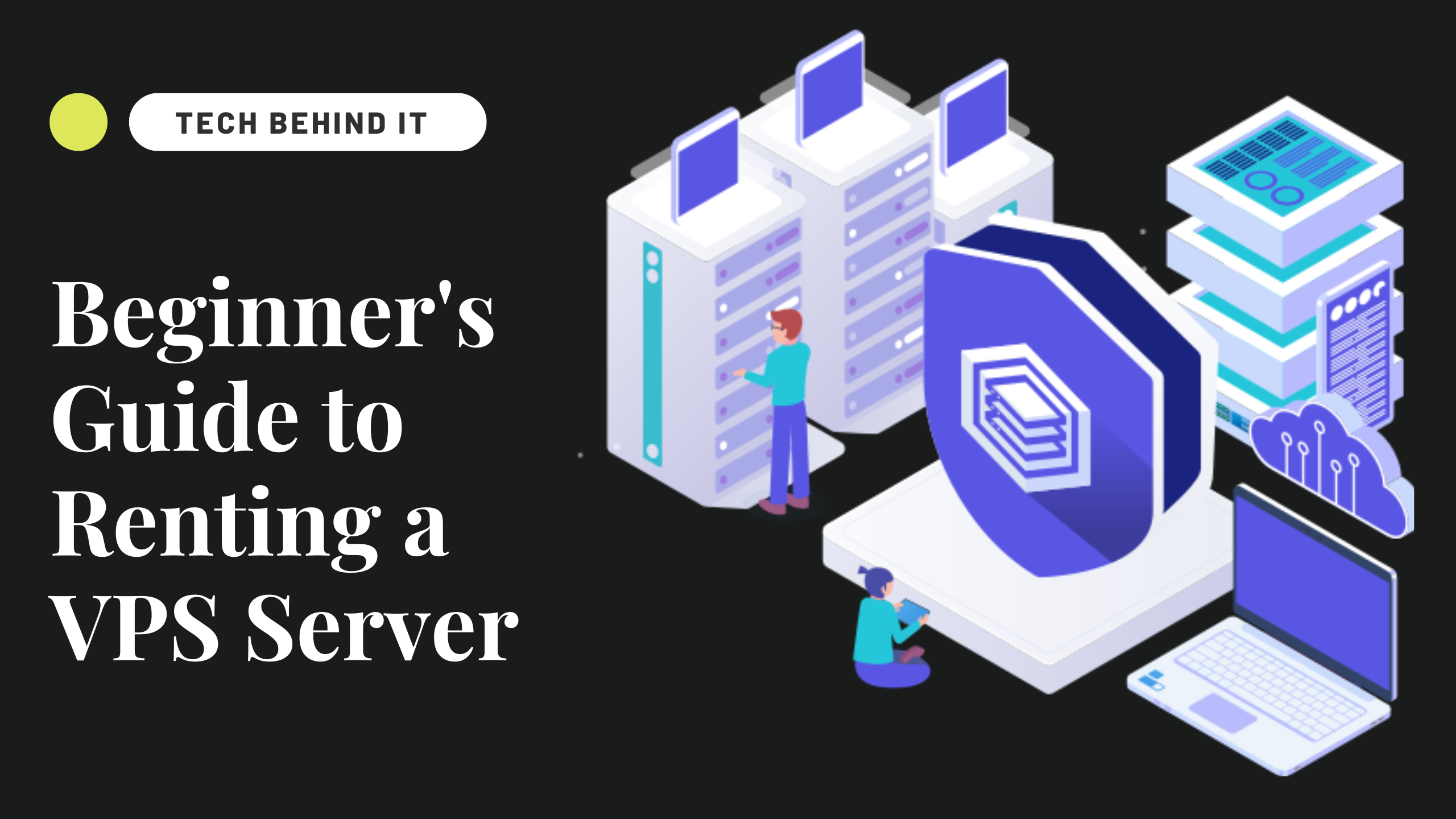A Beginner’s Guide to Renting a VPS Server: Understanding the Basics
- 1 What Is a VPS Server?
- 2 What Cases Is VPS Server Used For?
- 3 How to Choose the Right VPS Hosting Provider?
- 3.1 Uptime
- 3.2 Hardware
- 3.3 Backup services
- 3.4 Scalability Due to
- 3.5 Cost
- 4 Advantages and Disadvantages Of VPS
- 4.1 Benefits of a VPS
- 4.1.1 Enhanced Green Platform Efficiency
- 4.1.2 Increased Dependability
- 4.1.3 Enhanced Performance
- 4.1.4 Fully Managed Services
- 4.1.5 Enhanced Protection
- 4.2 Drawbacks with VPS
- 5 In summary
- 6 FAQs
What do you need before designing, developing, and preparing your website for launch? You are required to choose a web hosting service. Right? The files must be uploaded to a web server before your website becomes accessible online; hosting is critical for this crucial phase. Recently, website proprietors have transitioned from shared hosting, which involves multiple websites sharing a single server, to VPS hosting services owing to their numerous benefits. Contingent to the requirements of your organization and website, VPS hosting is a worthwhile investment.
What Is a VPS Server?
VPS is the abbreviation for “virtual private server.” To define VPS hosting, we shall describe the term “server.” A server is a robust computing device responsible for hosting the entirety of the data and files comprising a website.
That enormous computer “serves up” your website onto the user’s device so that they may interact with it when the user wishes to peruse your site. But what constitutes a “virtual” server? Each VPS divides a large server into several smaller virtual servers by utilizing virtualization technology. Every “smaller server” has a unique operating system, storage, RAM, and CPU. “Private” is the operative word here because only you utilize your virtual server when you utilize a VPS. It is exclusively yours, and you will not be required to share your CPU or RAM with other websites; this provides numerous benefits.
How Does it Work?
You must lease part of a more extensive physical server when renting a VPS server. Each VPS on the server has its own OS, CPU, RAM, storage, and configuration. This isolation prevents one VPS’s performance and security from affecting others on the server.
Why VPS Server Rental Services Is Needed?
- Customization: VPS hosting is very customizable. Choose an operating system, install and setup software, and tweak resource allocations.
- Performance: Unlike shared hosting, VPSes have dedicated resources. It improves website and app speed and loading.
- Scalability: VPS resources may expand with your website or business. Most hosting companies provide scalable CPU, RAM, and storage options.
- Root Access: VPS usually have root or administrator access. This level of control lets you adjust system settings, install custom apps, and configure servers.
Each VPS is segregated from others on the same physical server for security. This isolation reduces the danger of one user’s actions impacting others, improving safety. Many VPS hosting providers offer security and monitoring solutions.
What Cases Is VPS Server Used For?
Launch web apps
Anyone can launch and run web apps on VPS servers. For instance, Amazon VPS helped US gourmet meat shop Gourmet develop an inventory management system in weeks. They previously used supplier spreadsheets to manage inventories. The cloud-based inventory solution unifies reporting, decreases inventory management time, and offers critical decision-makers instant data access.
Create test environments
VPS servers provide cost-effective application development and testing—US startup Bugout. Dev created a developer search engine. To improve search and add new features, they conduct frequent trials. They execute their studies on a virtual private server due to their rejection rate to save money.
Secondary storage
A VPS can store data files secondarily. By providing safe, accessible, and centralized storage for a group of users, it may serve files, images, and emails.
How to Choose the Right VPS Hosting Provider?
Website proprietors should select a VPS hosting provider they feel confident in and comfortable with. KnownHost has worked hard to create reliable and cost-effective VPS services for our valued clients, and the outstanding features of our VPS hosting packages speak for themselves.
Uptime
A VPS hosting service will have an uptime rating of approx 99.5 percent. Anything lower than that is simply intolerable. Even each second your website delays could lead to significant reputational and financial losses for your company.
Hardware
When browsing for a website host, ask for information on the servers the hosting provider employs for their VPS services. A decent hosting service provider should offer the newest and most potent hardware. This should include solid-state drives (SSD), which, simply stated, lack moving elements and are thus faster than traditional hard drives.
Backup services
A reliable backup service is essential, particularly if you’re making some changes to your website and unintentionally making an error that is irreversible or causes you to lose everything. Thanks to the backup service of your VPS hosting provider, everything should be saved and simple to restore.
Scalability Due to
Ask your hosting provider what their process is for scaling VPS hosting on their servers. This means that, as your website and income develop, you may require more extensive VPS sources.
Cost
Most hosting providers will charge a monthly fee for a VPS subscription that includes an allocation of storage and RAM and a specified data transmission speed, bandwidth, and IP addresses. Packages range in price depending on the quantity of resources and the level of management provided.
Advantages and Disadvantages Of VPS
Benefits of a VPS
Enhanced Green Platform Efficiency
Green hosting and eco-friendly technologies have been popular in recent years. To minimize your carbon footprint, you must act.
Increased Dependability
Dominoes resemble shared hosting. One malicious user can crash the server. The good news is that shared hosting will soon disappear. More hosting businesses are overselling servers and adding customers. It will lead to unreliability and service discontinuation. Other websites on a shared server will affect your website’s uptime and speed. Your website will suffer if a 15-year-old web programming prospect crashes your server.
Enhanced Performance
You can perform better with additional resources allocated to your business. Your site loads faster due to increased capacity and processing power. This boosts SERP ranking, engagement, and conversion rates.
Fully Managed Services
Think again if you thought switching to VPS meant maintaining your server. Most hosting firms offer VPS hosting and handle this.
Enhanced Protection
Ensuring the safety of any online presence should be your priority. Virtual private server hosting, in contrast to shared hosting, offers better security. Virtual private servers (VPS) significantly reduce the likelihood of security flaws by separating your virtual servers from one another on the same physical server. Plus, you have more say over the server’s security settings so that you may put your firewalls and security software in place, for example.
Drawbacks with VPS
Decreased Staffing
Dedicated resources like CPU, RAM, and storage still need to be improved in VPS hosting despite this. Depending on the VPS plan chosen, the site’s ability to handle sudden spikes in traffic or exceed its assigned resources might be affected by resource limits. Contrarily, to meet resource needs, most reliable hosting services offer flexible growth options.
Knowledge of Technical Aspects Required
In contrast to virtual private server hosting, shared hosting does not call for advanced technical knowledge. If you’re using a virtual remote server (VPS), you’re responsible for setting up and managing your server. Installation of software, server setup, and security measures configuration are all part of this. On the other hand, many web hosts provide VPS hosting options handled by experts who take care of all the server administration for you.
Hosting Provider Dependence
When you sign up for virtual private server hosting, you trust your hosting company to handle server maintenance and issues. Selecting a trustworthy and reliable hosting company with 24/7 technical assistance is crucial for promptly resolving server problems and interruptions.
In summary
Pros and downsides exist with VPS hosting. There is a boost in performance, security, cost-effectiveness, scalability, and adaptability. It depends on the hosting company, has few resources, and requires technological know-how. After weighing these factors and your demands, you may determine if VPS hosting is right for your online business.
FAQs
Do small enterprises benefit from VPSs?
Of course! Small businesses may benefit from VPS hosting’s scalability, dedicated resources, and improved performance without paying the astronomical cost of dedicated hosting.
Is it possible to upgrade VPS plans?
Most hosting providers allow you to upgrade your VPS service as your needs change easily. One of the main advantages of VPS hosting is scalability.
How may I abuse my resources?
Your website can perform poorly if you use more resources than your VPS subscription allows. Reliable hosting companies, nevertheless, provide adaptable upgrades to satisfy resource requirements.
Is hosting on a VPS secure?
Shared hosting is less secure than VPS hosting. With its distinct security measures and user isolation, VPS hosting safeguards your online presence.
Can I set up my own VPS program?
You may personalize your virtual server, add unique apps, and change security settings with VPS hosting.
Does managing a VPS need technical expertise?
Although technical know-how is beneficial, many hosting providers provide easy-to-use control panels that simplify daily tasks. Server administration, security, and troubleshooting are recommended for optimal management.



















